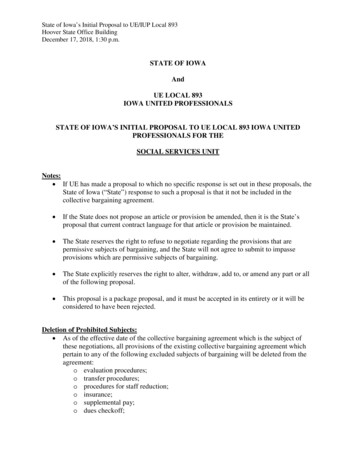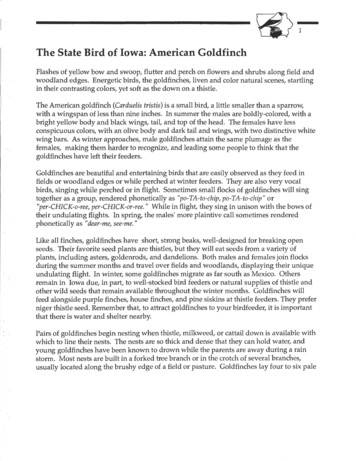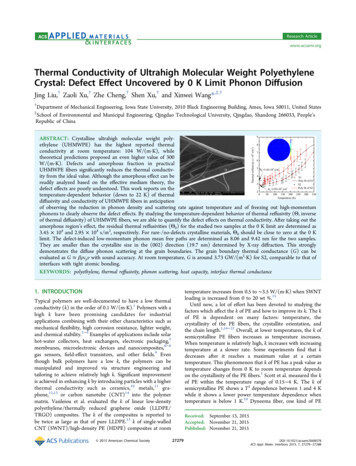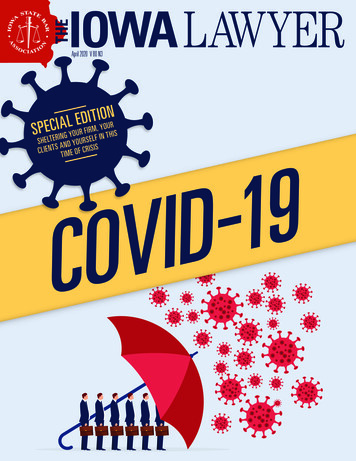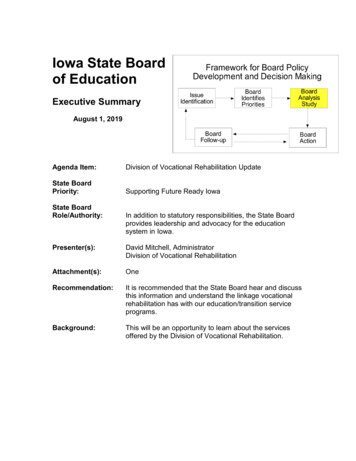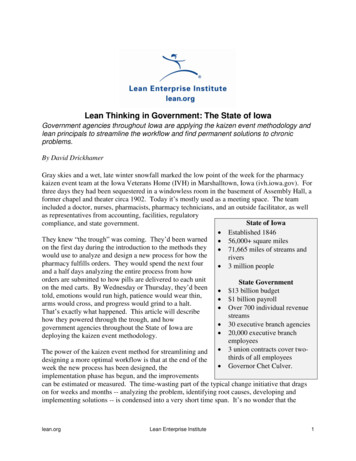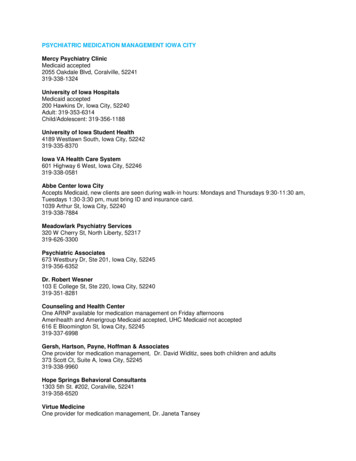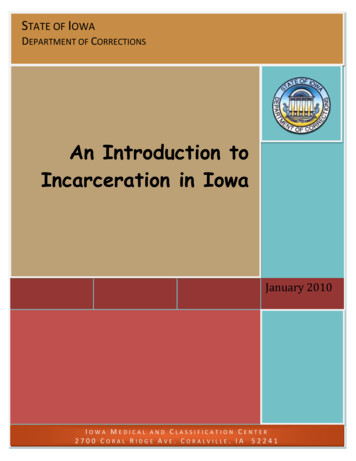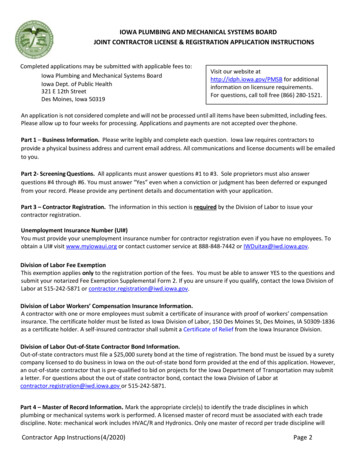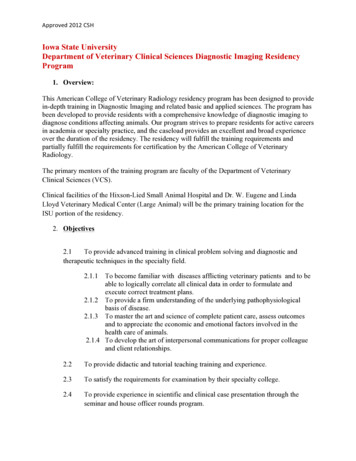
Transcription
Approved2012CSHIowa State UniversityDepartment of Veterinary Clinical Sciences Diagnostic Imaging ResidencyProgram1. Overview:This American College of Veterinary Radiology residency program has been designed to providein-depth training in Diagnostic Imaging and related basic and applied sciences. The program hasbeen developed to provide residents with a comprehensive knowledge of diagnostic imaging todiagnose conditions affecting animals. Our program strives to prepare residents for active careersin academia or specialty practice, and the caseload provides an excellent and broad experienceover the duration of the residency. The residency will fulfill the training requirements andpartially fulfill the requirements for certification by the American College of VeterinaryRadiology.The primary mentors of the training program are faculty of the Department of VeterinaryClinical Sciences (VCS).Clinical facilities of the Hixson-Lied Small Animal Hospital and Dr. W. Eugene and LindaLloyd Veterinary Medical Center (Large Animal) will be the primary training location for theISU portion of the residency.2. Objectives2.1To provide advanced training in clinical problem solving and diagnostic andtherapeutic techniques in the specialty field.2.1.1To become familiar with diseases afflicting veterinary patients and to beable to logically correlate all clinical data in order to formulate andexecute correct treatment plans.2.1.2 To provide a firm understanding of the underlying pathophysiologicalbasis of disease.2.1.3 To master the art and science of complete patient care, assess outcomesand to appreciate the economic and emotional factors involved in thehealth care of animals.2.1.4 To develop the art of interpersonal communications for proper colleagueand client relationships.2.2To provide didactic and tutorial teaching training and experience.2.3To satisfy the requirements for examination by their specialty college.2.4To provide experience in scientific and clinical case presentation through theseminar and house officer rounds program.
Approved2012CSH2.5To provide experience in the preparation and submission of scientific articles forpublication and/or presentation.2.6To provide experience in designing and conducting a clinical research project.3. Prerequisites3.1 Candidates must have a DVM or an equivalent degree.3.2 Candidates must have satisfactorily completed at least a one year rotating internshipor its equivalent post graduate veterinary experience.3.3 Candidates must have successfully completed the National Board examination or itsequivalent in the certifying country; must be approved to practice veterinary medicinein the United States.3.4 Candidates must be/become licensed to practice veterinary medicine in the state ofIowa prior to employment3.5 Candidates must have the goal of specialty board certification.3.6 Candidates must have a satisfactory moral and ethical standing.4Faculty Advisor4.1 The resident will be assigned to a faculty advisor (mentor) who has Diplomate statusin their specialty field within the first month of the program. This may be the same ora different person than the Program Director.4.2 Responsibilities of the advisor/ mentor include:4.2.1 The advisor will directly oversee the resident’s training and act as a liaisonwith other faculty members in the College of Veterinary Medicine.4.2.2 Direction and coordination of the clinical program4.2.3 Advice toward research, publications, and preparation for Specialty Boardexaminations4.2.4 Approval of requests by faculty for the resident to participate in teaching,research or other activities.4.2.5 Advising on preparation and reviewing presentation performance ofseminars and case rounds.4.2.6 Professional guidance.
Approved2012CSH5. VCS House Officer Seminar/ Rounds ProgramsThe VCS Seminar/Rounds Program are designed to provide the House Officer the opportunity toreceive and present interesting, unusual, or difficult clinical case material utilizing a problemoriented approach to professional colleagues and to develop manuscripts for publication. Theresident will participate with the other VCS house officers on a rotating basis and will make atleast 1 case presentation in House Officer Rounds during the year.The seminar series is designed to provide the House Officer with the opportunity to research andpresent scientific information to professional colleagues.5.15.2One seminar will be prepared and given in each year of the program.5.1.1 House Officer attendance at all VCS Seminar/Rounds sessions is required.Attendance will be taken at the beginning of each session.5.1.2 HO will be required to present an additional seminar if they have morethan one unexcused absence during the program year. All absences mustbe accounted for by communication with the Leader of the House OfficerCommittee and advisor.5.1.3 Excused absences include the following: illness, annual leave, attendanceor participation in a continuing education program, presentation of astudent lecture, scheduled out-rotation or special service requirements perrequest of advisor. All other absences are unexcused unless deemedexcusable by the HO advisor.House Officers attend and present in a variety of organized rounds and seminarsin support of their residency training and teaching experience. The menu ofrounds and seminars is tailored to assist residents in literature review and boardpreparation and to expose them to a broad range of clinical and academicexperiences schedules are subject to change but include:Type:Service Rounds w/studentsVCS Seminar/RoundsService Resident RoundsRadiology-Pathology RoundsEvidence based medicine RoundsMorbidity/Mortality RoundsStudent Grand RoundsJournal ClubTextbook Review SessionAnatomic Pathology Rounds.Rad-Equine Case RoundsFrequency:per programweekly (Thursday 8 a.m.)per servicemonthly (Tuesday 8 a.m.)monthly (Tuesday 8 a.m.)bimonthly (Tuesday 8 a.m.)weekly (Friday 8 equiredrequiredrequiredoptionaloptionalnot requiredrequiredrequiredoptionalrequired
Approved2012CSH6.0Teaching Program7.06.1Throughout the program residents will be viewed as role models by both internsand professional students. They should always present themselves in aprofessional manner.6.2The resident will participate in clinical instruction and may participate in theevaluation of veterinary students assigned to clinics.6.3The resident will participate in preclinical didactic lecture and laboratoryinstruction as assigned by his/her advisor.Board Certification8.07.1An important credential in veterinary medicine is board certification in a specialtyarea. One of the objectives of the program is to prepare the resident forcertification by the American College of Veterinary Radiology7.2In order to qualify for examination the resident should refer to the publishedrequirements of the college.7.3It is solely the responsibility of the resident to submit any material and feesrequired by the specialty college for registration, credentials applications or boardexaminations. (www.ACVR.com)Clinical Program – Diagnostic Imaging Total length of the training program in months: 36 MonthsTotal duration of supervised clinical training in the program: 30 MonthsResponsibilities of the resident in the remaining non-clinical portion of the program:1. to complete a residency research project, to draft the results in a manuscriptsuitable for publication, and to present the research findings to an audience ofpeers in the second or third year of the program.2. to successfully complete course instruction in radiation physics and radiationbiology.3. to participate in instructional delivery of the normal anatomy of veterinarydiagnostic imaging to first year veterinary students.Below is a description of the 36 months of training.
&Biology)Diagnostic Imaging Objectives/Goals:1. To master the art and science of veterinary diagnostic image interpretation in all coreareas, to be able to logically correlate all imaging findings and clinical data in order toformulate accurate conclusions which, in turn, may provide direction for casemanagement and to appreciate the economic and emotional factors related to the healthcare of veterinary patients.2. To provide a firm understanding of the underlying radiation physics and anatomic basisof veterinary diagnostic imaging.3. To develop expertise in interpersonal communications for proper colleague and clientrelationships.4. To allow the resident an opportunity to develop teaching skills as they participate in theeducational training of veterinary students.5. To constantly pursue academic enrichment.6. To complete a residency research project, to draft the results in a manuscript suitable forpublication, to obtain instruction and guidance in manuscript writing and submission forpublication in refereed journals and to present the research findings to an audience ofpeers in the second or third year of the program.7. To satisfy all requirements to sit both the written and oral examinations of the AmericanCollege of Veterinary Radiology8.1 Year I Resident's Program8.1.1 Training described above.8.1.2 The resident will participate in the instruction of clinical students and interns.Participation in CVM student laboratories will be assigned as needed.8.1.3 The resident will participate in house officer rounds, ward rounds, journal club,special topic conferences, seminars, and other scheduled conferences of the VMC.He/She will attend other scheduled seminars in the CVM as time permits.8.1.4 The resident will present 1 seminars (to faculty and house officers) on a topic ofinterest to the resident and 1 case report in VCS Seminar/Rounds8.1.5 The resident will participate in Known Case Conference approximately every 3weeks.
Approved2012CSH8.1.6The resident may attend a major professional meeting at some point during theprogram with the advice and approval of his/her faculty advisor and the houseofficer committee. Expenses will be paid by the resident. The meeting must bescheduled during a non-clinical block.8.1.7 The resident is encouraged to attend and participate in continuing educationmeetings sponsored by the CVM or by local and regional veterinaryorganizations.8.1.8 The resident must register with the specialty college prior to August 31st andfollow their requirements. (www.acvr.org)8.1.9 The resident is encouraged to prepare a research proposal; review it with his/herfaculty mentor, and submit it for funding consideration.8.1.10 The resident may, with the approval of the resident's advisor and the faculty,participate in clinically relevant graduate courses. Course work must not interferewith the clinical and instructional responsibilities of the resident.8.2 Year II Resident's Program8.2.4 Training described above.8.2.5 The resident will present one seminar and one case report (to faculty and houseofficers) on a topic of interest to the resident in the VCS Seminar/Rounds session.8.2.6 The resident will keep a log of cases assessed during external rotations which willbe submitted to the residency director following each experience.8.2.7 The resident should make applications for sitting examinations if applicable.8.2.8 The resident will begin or continue the research project if funding has beenobtained.8.3 Year III Resident’s Program8.3.4 The resident will submit one paper suitable for publication to their mentor and theHouse Officer Chair by June 1.8.3.5 The resident will present one seminar and one case report (to faculty and houseofficers) on a topic of interest to the resident in the VCS Seminar/Rounds session.8.3.6 The resident will keep a log of cases assessed during external rotations which willbe submitted to the residency director following each experience.8.3.7 The resident should make applications for sitting examinations if applicable.8.4 Year 4 – NA8.5 Outside Rotations:Some ancillary clinical experiences will be accomplished off-site.8.5.1 One semester each of Radiation Physics and Radiation Biology courses –to be completed at the School of Radiograpic Technology, School ofAllied Health, Mercy College of Health Sciences – Des Moines. ProgramChair: Dr. Suzanne Crandall, Ed.D, R.T. (Tuition costs covered by VCSDepartment.)8.5.2 Three week Radiation Oncology and Nuclear Medicine External Rotationto be completed at the University of Missouri-Columbia in second year.
Approved2012CSH8.5.38.5.49Faculty Contact: Dr. Jimmy Lattimer, Diplomate, American College ofVeterinary Radiology / Radiation Oncology. (Travel and housing costscovered by resident.)Three week Large Animal Ultrasound External Rotation – to be completedat New Bolton Center Campus, University of Pennsylvania in 2nd year.Faculty Contact: Dr. Virginia Reef, DVM. (Travel and housing costscovered by resident.)Three day Nuclear Medicine Short Course – to be completed at theUniversity of Tennessee in second year. Faculty Contact: Dr. FerdericaMorandi, Diplomate, American College of Veterinary Radiology.Research ProjectThe Department of Veterinary Clinical Sciences requires its residents to participate inscholarly activity such as literature reviews, and basic, applied or clinical research. Tothat end the resident is -encouraged to:9.1 Design a research project to address a specific question or problem in the discipline9.2 Write a research grant proposal that may be used to seek funding for the project.9.2.1 The anticipated timeline for completion of the project should be completedby December of the 1st year.9.2.2 Proposals are to be submitted for funding. .9.3 Conduct the research according to the experimental design.9.3.1 Research is to be conducted during off-clinic time.9.3.2 Completion is expected during the residency.9.4 Analyze and report the results of the project9.4.1 Research is to be presented to the VCS faculty and residents duringseminar.9.5 Publication of these results in a refereed journal is strongly encouraged9.5.1 A manuscript suitable for publication is to be completed prior to theconclusion of the residency.10 Facilities and Equipment10.1The College of Veterinary Medicine Teaching Hospital (VTH) is a fully accreditedhospital (AAHA, AALAC) with full AVMA accreditation.The facilityencompasses the Iowa State Veterinary Diagnostic Laboratory, an accredited(AAVLD) full service laboratory providing clinical pathology, histopathology,immunohistochemistry, immunology, microbiology, virology and toxicologysupport. The VTH contains full service small and large animal medicine andsurgery facilities.10.2 Library and other Literature ResourcesThe Veterinary Medical Library, housed within the College of VeterinaryMedicine building, contains both human and veterinary textbooks as well asbound serial publications. Parks library on main campus is easily accessible viadaily transport of holdings between libraries upon request. An extensive
Approved2012CSHcollection of online journal subscriptions is available to the resident free of chargevia the Interlibrary Loan/ Document Delivery service. Computer-based retrievalsystems MEDLINE, CAB and AGRICOLA abstracts are available electronically.A wide selection of current journals is available in the library and online.10.2.1 Each resident is required to be familiar with pertinent articles in thecurrent literature. Reasonable expenses for photocopying are defrayed by theHospital.10.3 Diagnostic Imaging - see appendix 15.9 for details11 Evaluation and Reappointment11.1A written critique will be provided at least every 6 months by the advisor or section.The critique will cover:11.1.1 Professional ability; to include theoretical knowledge and application ofthat knowledge, clinical skills, tutorial skills, and scholarly activity.11.1.2 Hospital services; to include communication skills, patient care, medicalrecord quality, emergency duty quality, and adherence to VMCprotocol.11.1.3 Personal characteristics; to include responsibility, initiative, interactionwith faculty, staff and students, deportment and leadership11.2 The resident will meet with his or her advisor on a quarterly basis to discuss theirprogress. A summary of the discussion will be signed by both advisor and resident.11.3 In March of each year, the House Officer Committee will review the year'scritiques. Following that review, the committee will make a recommendationto the Head of the Department of Veterinary Clinical Sciences to:11.3.1 Continue the appointment for another year with or without probation11.3.2 Award a certificate upon satisfactory completion of the program.11.3.3 Not to reappoint the resident, with a minimum of 30 days’ notice oftermination. At the discretion of the House Officer Committee and inconsultation with the resident’s service, guidelines can be formulatedthat if met, may allow the resident to be re-instated at the end of thespecified period.11.4 The resident will be asked each year to make an assessment of their program withsuggestions for improvement. The evaluation form will be handed out in May orJune and must be returned before completion of that year in July12 House Officer CommitteeThe committee is comprised of a representative of each house officer program, the VCS Head(ex officio), and the Director of the VMC (ex officio). It will be responsible for:12.1 The selection of residents from the application pool (with the advice of the facultyof the sponsoring discipline).12.2 Annual review of the resident's progress (in the ninth month of each year).
Approved2012CSH12.3 Annual recommendation for reappointment of the resident or program completion.12.4 Program approval, renewal, oversight and establishment of policy.13 Employment and Benefits13.1Iowa State University residents and interns are classified as adjunct, non-tenureeligible faculty and as such are governed by the faculty current)13.2Iowa State University offers a competitive salary and a comprehensive benefitpackage to house officers. Full faculty benefits are provided, including medical,dental, and professional liability (limited). House officers are encouraged toinvestigate personal professional liability insurance ulty- ‐Benefit- ‐Summary- ‐2011.pdf)13.3 The salary for residents is approximately 29,000.00; incremental annual raisesmay be awarded in the second and third year. The salary (not a stipend) ispublished in the Directory of Internships and Residencies as published by theAmerican Association of Veterinary Clinicians (www.virmp.org). Salary is payablein monthly increments. Retirement contributions, social security, federal and statetaxes are withheld from each paycheck.13.4 As employees of the University residents and interns are considered full-timeadjunct faculty and earn 16.0 hours per month of vacation/annual leave (192 hoursor 24 days/year) and 12.0 hours per month of sick leave.13.4.1 Annual leave may only be taken/granted for the amount of timeaccrued.13.4.2 Annual leave is to be taken when the house officer is not scheduled onclinic or emergency duty. Vacation requests must be made at least 2weeks in advance of the desired vacation time.13.4.3 After approval by the House Officer’s advisor, requests must be madeon the standard University Leave Form reviewed by the ProgramDirector/Coordinator and signed by the program’s Section Leader andthe Chair of the Department of Veterinary Clinical Sciences or theHospital Director.13.4.4 Accrued vacation time must be used during the term of the appointmentor it will be forfeited upon termination. Vacation must not be usedduring the final three weeks of the term of the appointment.13.5 A cell phone, desk, chair, place for book storage, and 5-drawer filing cabinet arealso provided for each resident. A computer system is provided with wordprocessing, spread sheet and presentation programs along with unlimited internetaccess and e-mail.13.6 The Veterinary Medical Center operates year round. The resident will share withother house officers an emergency duty rotation. The rotation will commit theresident to a share of evening, weekend and holiday duty on a scheduled basis.13.7 Consultation Policy (Outside Employment)
Approved2012CSHConcurrent employment of interns and residents at a site other than Iowa StateUniversity, College of Veterinary Medicine during their program is allowedprovided the activity is approved by the House Officer’s advisor and the programdirector and a CVM Consultation Request Approval Form is completed andapproved by the department chair and the college dean prior to any consultingactivities.13.8 Reappointment to the second, third and fourth year of the residency program iscontingent upon satisfactory completion of the previous year's requirements.14 Applications14.1 Candidates may apply for the Residency in by completing:14.1.1 A standard residency online application (V.I.R.M.P. application).14.1.2 A statement of objectives for the residency and subsequent career goals.14.1.3 A transcript of his/her academic record.14.1.4 Three letters of reference from individuals currently familiar with theapplicant's professional status.14.1.5A curriculum vitae14.2 Selection is based on:14.2.1 The above documents.14.2.2 Interviews may be required.14.3For more information about this program, please contact Dr. Kristina Miles, IowaState University, College of Veterinary Medicine, Department of Veterinary ClinicalSciences, 1600 South 16th Street, Ames, Iowa 50011-1250. (Telephone 515-294-4900;email: kmiles@iastate.edu ).14.4 Iowa State University does not discriminate on the basis of race, color, age,religion, national origin, sexual orientation, gender identity, sex, marital status,disability or status as a U.S. veteran. Inquiries can be directed to the Director of EqualOpportunity and Diversity, 3680 Beardshear Hall, (515) 294-7612.15Appendices15.1 Faculty in support of the Program15.2 Code of Conduct & Collegiality15.3 Communication Tree15.4 Consultation Request15.5 House Officer Leave Request ( in VCS office)15.6 House Officer Rounds Evaluation Form15.7 VCS Seminar Evaluation Form15.8 HO Evaluation Form15.9 DiagnosticImaging Service Information
Approved2012CSH15. 1 Faculty in Support of the Residency Programs:Residency Program Director: Kristina Miles, DVM, MS, DACVRFacultyListed below are the ISU imaging faculty accepting PRIMARY responsibility for training ineach of the following core areas:Roentgen diagnosisFaculty: Elizabeth Riedesel, DVM, DACVRPercentage clinical service: Approx. 65 %Diagnostic ultrasoundFaculty: Kristina Miles, DVM, MS, DACVRPercentage clinical service: Approx. 70 %Computed TomographyFaculty: Elizabeth Riedesel, DVM, DACVRMagnetic Resonance ImagingFaculty: Elizabeth Riedesel, DVM, DACVRNuclear MedicineFaculty: Kristina Miles, DVM, MS, DACVRMini-Curriculum Vitae – Kristina Miles, DVM, MS, Diplomate, ACVRResume – Suzanne Elizabeth Crandall, Ed.D., R.T.(R)Current Residents In-Training:Jackie Williams, DVM, (2010-2013)Lindsey Gilmour, DVM, (2011-2014)Brandon Cain, DVM (2012-2015)PathologyAmanda Fales-Williams, DVM, PhD, Diplo. ACVPJesse Hostetter, DVM, PhD, Diplo. ACVPMark Ackerman, DVM, PhD, Diplo. ACVPAnesthesiologyDean H. Riedesel, DVM, PhD, Diplomate ACVABonnie H. Kraus, DVM, Diplomate ACVS, Diplomate ACVAMartha L. Buttrick, DVMChristopher Kelly, DVMCardiology
Approved2012CSHWendy A. Ware, DVM, MS, Diplomate ACVIM (Cardiology)DermatologyJames O. Noxon, DVM, Diplomate ACVIM (Internal Medicine)Elizabeth May, DVM, Diplomate ACVDDiana Miller, DVMDiagnostic ImagingKristina G. Miles, DVM, MS, Diplomate ACVRElizabeth A. Riedesel DVM, Diplomate ACVREmergency and Critical Care MedicineMichael Curtis, DVM, PhD, Diplomate ACVAInternal MedicineJo Ann Morrison, DVM, MS, Diplomate ACVIM (Internal Medicine); Residency ProgramDirectorClaudia J. Baldwin, DVM, MS, Diplomate ACVIM (Internal Medicine) - practice limited toconsultationAlbert E. Jergens, DVM, PhD, Diplomate ACVIM (Internal Medicine)Robert R. King, DVM, PhD, Diplomate ACVIM (Internal Medicine); Associate HospitalDirectorKrysta Deitz, DVM, MS, Diplomate ACVIM (Internal Medicine)Cody Alcott, DVM, Diplomate ACVIM-LABrett Sponseller, DVM, PhD, Diplomate ACVIM-LADavid Wong, DVM, MS, Diplomate ACVIM-LA, ACVECCNeurologyRod Bagley, DVM, Diplomate ACVIM (Neurology), Department Chair and ExecutiveHospital Director - practice limited to consultationNicholas Jeffery, BVSc PhD, Diplomate ECVIM (Neurology)OncologyLeslie E. Fox, DVM, MS, Diplomate ACVIM (Internal Medicine)OphthalmologyDavid Whitley, DVM, MS, Diplomate ACVOGil Ben-Sholmo, DVM, PhDRachel Allbaugh, DVM, MS, Diplomate ACVOPrimary CareBianca Zaffarano, DVMBrenda Mulherin, DVMLinda K. Kauffman, DVMSusan E. O'Brien, DVMSurgery -CASKarl Kraus, DVM, Diplomate ACVSMary Sarah Bergh, DVM, MS, Diplomate ACVSCheryl Hedlund, DVM, MS, Diplomate ACVSWilliam D. Hoefle, DVM, MS, Diplomate ACVSIngar A. Krebs, DVMSurgery – EquineScott McClure, DVM, PhD, Diplomate ACVS(Larry Booth, DVM, MS, Diplomate ACVS)
Approved2012CSHStephanie Caston, DVM, Diplomate ACVSKevin Kersh, DVM, Diplomate ACVS(Jennifer Schleining, DVM, MS, Diplomate ACVS)Eric Reinertson, DVMTheriogenologyLawrence E. Evans DVM, PhD, Diplomate ACT
Approved2012CSH15.2Code of professional conductA code of conduct is meant to help guide professionals in proper interaction with otherprofessionals. No document can be all inclusive or specific. This list is meant to direct aprofessional veterinarian, or veterinary student, toward proper conduct and interactions withinthe hospital and college.1. Each clinician (faculty, residents, and interns) has numerous interactions with veterinarystudents and should realize that they are role models for these students. Professional attireand language, and appropriate interactions with referring veterinarians are expected at alltimes. All clinicians must take care to never use denigrating or insulting language whenreferring to other veterinarians including referring veterinarians, or to students.2. Clinicians should refer to each other and other veterinarians as “Doctor” while in thehospital and should instruct students to do the same.3. All clinicians should strive for the best care for all patients in our hospital. It is inevitablethat there will be differences of opinion as to what that best care entails. There is also thepossibility that a clinician, for whatever reason, is not caring for a patient to a standardappropriate for this hospital. If a clinician feels that a patient is not cared forappropriately or to a certain standard, then that clinician should discuss their concernswith the attending clinician in a collegial manner (in private venue, not in front ofcolleagues or students).4. It is appropriate to collegially discuss the care of cases in case rounds and in the presenceof the attending clinician on the case. It is inappropriate to question the care of a patientby another clinician in the presence of clients, students, house officers, referringveterinarians, or attending clinicians outside of case rounds or without the presence of theattending clinician. This is a severe breach of medical ethics and may warrant correctivemeasures.5. Students and clinicians come from diverse backgrounds and cultures. It is inappropriateto discuss another professional’s personal life while conducting hospital business.College of Veterinary Medicine Collegiality Policy:All CVM employees have a responsibility to maintain a positive workplace that is free ofdiscrimination and harassment. Collegial interactions with all co-workers in the CVM arerequired. Faculty and staff are expected to model safe and fiscally responsible behavior forstudents, and are expected to be in compliance with established policies of the CVM and IowaState University (including the ISU Code of Computer Ethics and Acceptable Use, biosafetyregulations, OSPA, purchasing, etc.). All faculty and staff are expected to participate in theannual performance evaluation process.
.O.(Service1)meetwithOn- twithOn- ‐clinicservice(2)facultyConflictunresolvedOn- ‐clinicservice(1)facultyOn- nresolved Protocolestablished ToDept.Head(program'issues) isedwhendeemedappropriate.
n )ToHospitalDirector(hospitalissues)
Approved2012CSH15.4ConsultingRequestCollege of Veterinary MedicineIowa State UniversityCONSULTING*REQUEST*APPROVAL*FORM*This form must be approved by the Department Chair/
4.2 Responsibilities of the advisor/ mentor include: 4.2.1 The advisor will directly oversee the resident’s training and act as a liaison with other faculty members in the College of Veterinary Medicine. 4.2.2 Direction and coordination of the clinical program 4.2.3 Advice toward re
